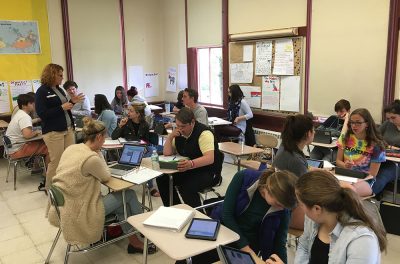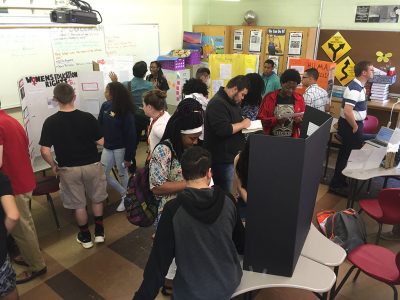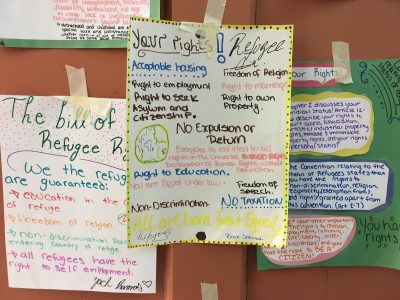With 80 students currently majoring in the University’s human rights undergraduate program and another 40 to 50 enrolled as human rights minors, UConn stands out as one of just a handful of universities in the nation offering a degree program in the field of human rights.
But educating students in human rights issues need not be exclusive to college campuses, as Glenn Mitoma, assistant professor of human rights and curriculum and instruction, can attest.

Last fall, Mitoma piloted a launch of an introductory UConn course in human rights at three Connecticut high schools, in partnership with the University’s Early College Experience (ECE). UConn’s ECE program allows high schoolers across the state to take university-level courses taught by specially trained teachers at their school while earning credits that can be transferred toward a degree at UConn or other universities. The course is the only known concurrent enrollment course offered today in the field of human rights in the United States, Mitoma says.
“UConn has the leading human rights program in the country. We have this tremendous resource, and I am really looking to make the most of it for the secondary and primary education communities,” says Mitoma, who has joint appointments in the Neag School and UConn’s Human Rights Institute, while also serving as director of the Thomas J. Dodd Research Center. “My ambition is to make Connecticut a national model for human rights education.”
The piloted course – which was offered during the 2015-16 academic year at Manchester High School, East Hartford High School, and Woodstock Academy – is oriented around inquiry- and project-based learning. At Manchester High, for example, part of the coursework includes having students develop interactive exhibits around specific human rights issues — a miniature human rights “museum” of sorts that, Mitoma says, pushes students to translate the research skills they acquire into “practices that then help communicate, or make a point, about a particular human rights issue.”
“My ambition is to make Connecticut a national model for human rights education.” Glenn Mitoma, assistant professor of human rights and curriculum and instruction
Jacob Skrzypiec ’13 (ED), ’14 MA, a Neag School graduate and social studies teacher who began teaching the ECE course at Manchester High last fall, says the impact of the coursework on his own students is clear.
“Connecticut students in particular, many having lived their entire lives in somewhat isolated/independent hamlets of the state, divided by social, economic, and political limitations beyond their control, can sometimes have a narrow perspective on the world around them,” Skrzypiec says. “The reward for high school students taking a course or engaging in human rights education experiences is endless, as they can not only become greater global citizens, but can be nurtured to think, rationalize, and critique as engaged, focused participants of society. For me, the best is seeing my students gain a greater sense of empathy, compassion and understanding for others.”

In fact, the course has been so well received at Manchester High that, come the 2017-18 academic year, it will require all juniors to complete coursework in human rights in order to matriculate — a development about which Skrzypiec says he is particularly proud.
The success of the piloted course, from Mitoma’s perspective, has been twofold. “One is the demonstrated impact on students,” he says. “The students immediately begin making connections, looking to past examples and historical instances of either human rights abuse or human rights struggles to contemporary manifestations.” Seeing students begin to make these connections, Mitoma adds, “is always a mark that we’re having the kind of impact we want.”

Another measure of success is evident in the professional networking that has naturally developed among the ECE teachers, Mitoma says. For instance, fellow ECE teachers, including Skrzypiec, are now collaborating to organize a series of human rights conferences for high school students — to be hosted at UConn later this year — that are meant to foster discussion around human rights issues and to allow high schoolers to hear from experts in the field.
In light of its growing success over the past year, the course will now expand this fall to two additional partner high schools — Conard High School in West Hartford as well as Crosby High School in Waterbury. A second Neag School alum, Abigail Esposito ’14 (ED), ’15 MA, will be teaching the course at Conard.
“I am very happy that we can offer such an important and specialized course at the high schools,” says Brian Boecherer ’03 (CLAS), ’14 MA, executive director of Office of Early College Programs and ECE at UConn, who worked with Mitoma to launch the piloted course in Fall 2015. “This is a very important course for many students because I think it allows them to become aware of a major that is yet not well known. It also allows highly credentialed instructors at the high schools an academic home where they can feel part of something much larger.”
At the same time, Skrzypiec adds, giving high schoolers the opportunity to take a college-level human rights course “can push students to rise to the academic rigor expected in a collegiate course, while also allowing students to discuss and grapple with potentially controversial issues not otherwise touched in high school classrooms.”
To learn more about the human rights ECE course or ongoing efforts to expand human rights education and programming, contact Glenn Mitoma at glenn.mitoma@uconn.edu. Follow him on Twitter @GlennMitoma. Find more information about the Thomas J. Dodd Research Center at doddcenter.uconn.edu, or at @DoddCenter on Twitter and at facebook.com/doddimpact on Facebook.
Assistant Professor Glenn Mitoma also recently led the Upstander Academy, a weeklong research and engagement program for middle and high school teachers designed to examine the role that intellectual humility can play in meaningful public dialogue. Read more about the Upstander Academy here.
 Facebook
Facebook
 Twitter
Twitter
 LinkedIn
LinkedIn
